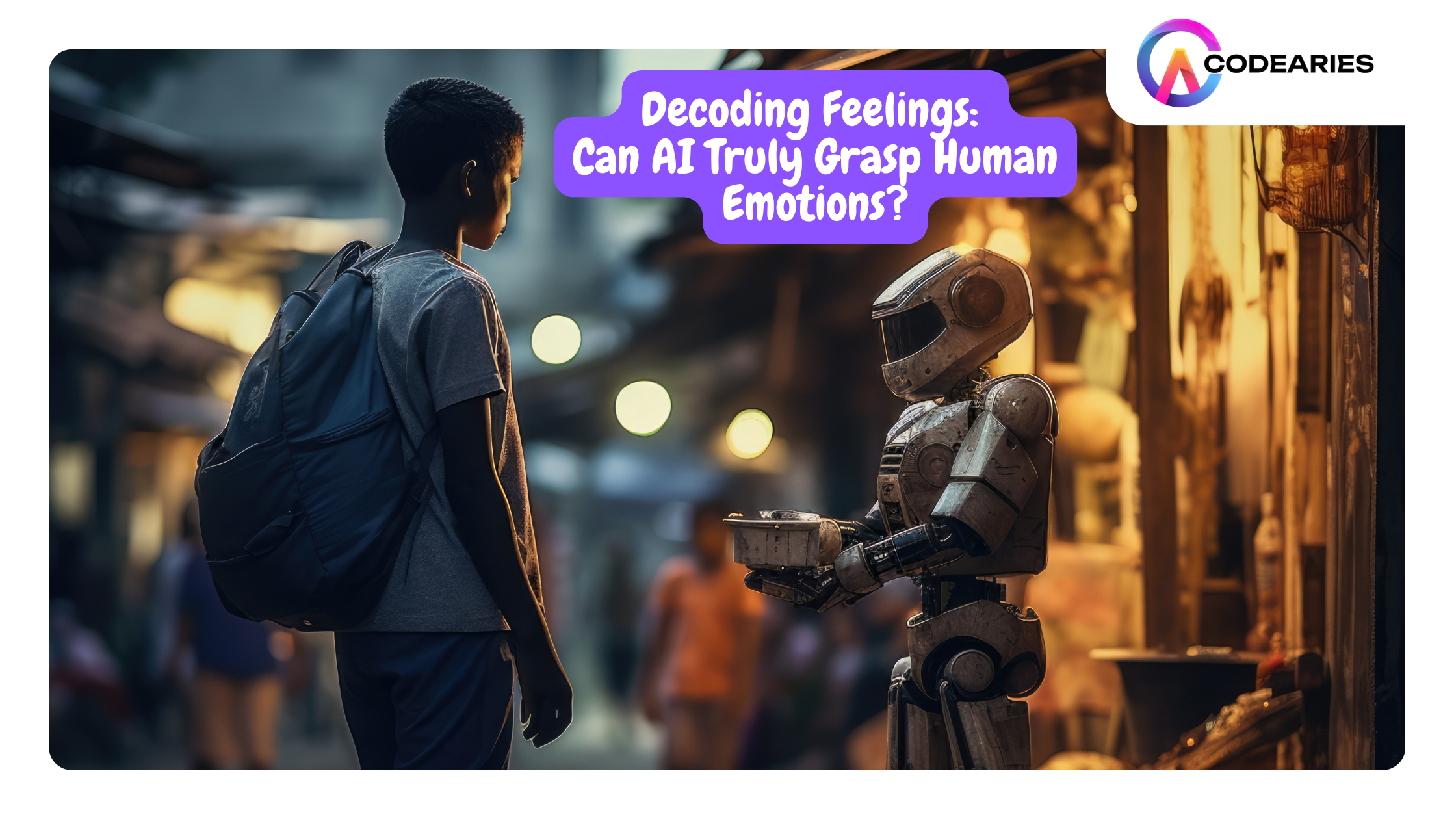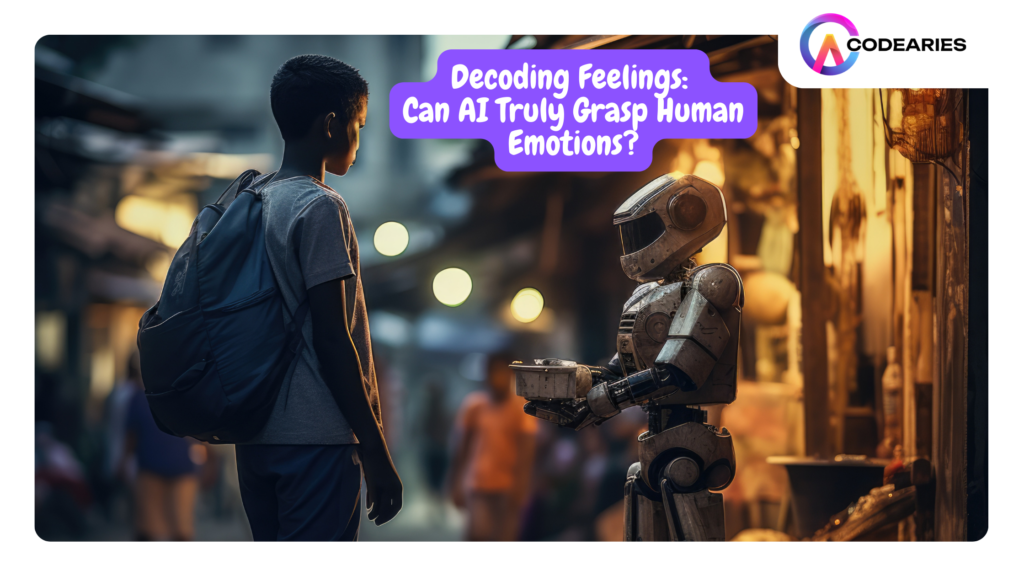
Decoding Feelings: Can AI Truly Grasp Human Emotions?

Introduction
Artificial Intelligence (AI) has made significant strides in recent years, evolving from simple rule-based systems to complex neural networks capable of learning and adapting. One of the most intriguing and impactful areas of AI development is emotional intelligence (EI). Emotional intelligence refers to the ability of AI systems to understand, interpret, and respond to human emotions. This capability opens up numerous applications, particularly in fields such as therapy and customer service, where understanding emotions is crucial.
Understanding Emotional Intelligence in AI
Emotional intelligence in AI involves the development of algorithms and models that can detect and interpret human emotions through various inputs, such as facial expressions, voice tones, text analysis, and physiological signals. These systems use a combination of machine learning, natural language processing (NLP), and computer vision to analyze and respond to emotional cues.
Key Components of AI Emotional Intelligence
- Emotion Recognition: The process of identifying human emotions from input data. This can involve facial recognition software that detects micro-expressions, voice analysis that picks up on tone and pitch, and text analysis that understands sentiment from written communication.
- Sentiment Analysis: A subfield of NLP that focuses on determining the emotional tone behind a body of text. It is widely used in social media monitoring, customer service, and market research.
- Affective Computing: This is the broader field encompassing the development of systems that can simulate and respond to human emotions. It includes creating models that predict emotional states and designing interactions that can elicit desired emotional responses.
Advancements in AI Emotional Intelligence
Recent advancements in AI emotional intelligence have been driven by improvements in data collection, algorithm development, and computational power. Some notable developments include:
- Deep Learning: The use of deep neural networks has significantly improved the accuracy of emotion recognition systems. These networks can process vast amounts of data and learn complex patterns associated with different emotional states.
- Multimodal Emotion Recognition: Combining data from multiple sources (e.g., facial expressions, voice, and text) has enhanced the ability of AI systems to accurately detect emotions. This approach mimics the way humans perceive emotions through various sensory inputs.
- Real-Time Emotion Analysis: Advances in processing speed and algorithm efficiency have enabled real-time emotion analysis. This is crucial for applications like customer service, where immediate responses are required.
Applications of AI Emotional Intelligence
1. AI in Therapy
One of the most promising applications of AI emotional intelligence is in the field of therapy. Mental health is a critical area where understanding and responding to emotions is essential. AI systems can provide valuable support to therapists and patients alike.
Benefits of AI in Therapy:
- Accessibility: AI-powered therapy platforms can make mental health support more accessible, especially in underserved areas. Virtual therapy sessions can be conducted via smartphones or computers, reducing the need for in-person visits.
- Consistency: AI systems can provide consistent and unbiased support. They do not experience fatigue or bias, which can sometimes affect human therapists.
- Data-Driven Insights: AI can analyze large datasets to identify patterns and provide personalized treatment recommendations. This can enhance the effectiveness of therapy by tailoring approaches to individual needs.
Examples of AI in Therapy:
- Woebot: An AI-driven chatbot that uses cognitive-behavioral therapy (CBT) techniques to help users manage their mental health. Woebot engages in conversations with users, providing support and guidance based on their emotional state.
Ellie: Developed by the University of Southern California’s Institute for Creative Technologies, Ellie is a virtual therapist that uses facial recognition and voice analysis to detect emotions and provide appropriate responses.
2. AI in Customer Service
Customer service is another area where emotional intelligence in AI can make a significant impact. Understanding customer emotions can enhance interactions, improve satisfaction, and drive loyalty.
Benefits of AI in Customer Service:
- Personalized Interactions: AI can analyze customer emotions to tailor responses and provide more personalized service. For example, an AI system can detect frustration in a customer’s voice and prioritize their issue.
- Efficiency: Emotionally intelligent AI can handle routine inquiries efficiently, allowing human agents to focus on more complex issues. This can lead to faster resolution times and higher customer satisfaction.
- Proactive Support: AI can predict potential issues based on emotional cues and proactively offer solutions. This can prevent problems from escalating and improve the overall customer experience.
Examples of AI in Customer Service:
- Amelia: Developed by IPsoft, Amelia is an AI customer service agent that uses NLP and sentiment analysis to understand and respond to customer emotions. Amelia can handle complex customer interactions and escalate issues to human agents when necessary.
- Cogito: Cogito’s AI platform analyzes voice interactions in real-time to provide agents with feedback on customer emotions. This allows agents to adjust their approach and improve the quality of the interaction.
Future Prospects and Challenges
The future of AI emotional intelligence holds immense potential, but it also presents several challenges. Addressing these challenges is crucial for the successful integration of emotionally intelligent AI systems into everyday life
Future Prospects
- Enhanced Human-AI Collaboration: As AI systems become more emotionally intelligent, they can serve as valuable collaborators in various fields. For example, in healthcare, emotionally intelligent AI can assist doctors in understanding patient emotions and improving patient care.
- Improved Human-Machine Interaction: Emotionally intelligent AI can make interactions with machines more natural and engaging. This can enhance user experiences in applications ranging from virtual assistants to educational tools.
- Broader Applications: Beyond therapy and customer service, emotionally intelligent AI can find applications in areas such as education, entertainment, and social robotics. For instance, AI tutors can use emotional cues to adapt their teaching methods to individual students’ needs.
Challenges
- Ethical Considerations: The use of AI to analyze and respond to emotions raises ethical concerns related to privacy, consent, and data security. It is essential to establish guidelines and regulations to protect users’ emotional data.
- Accuracy and Bias: Ensuring the accuracy of emotion recognition systems is challenging, as emotions can be complex and context-dependent. Additionally, AI systems must be designed to avoid biases that could lead to unfair treatment or misinterpretation of emotions.
- Human Acceptance: For emotionally intelligent AI to be widely adopted, it must gain the trust and acceptance of users. Building transparent and user-friendly systems that respect human emotions and provide clear benefits is crucial.
CodeAries: Pioneering Emotional Intelligence in AI
CodeAries, a leading provider of IT software development services, is well-positioned to develop advanced platforms that leverage emotional intelligence in AI. By combining expertise in machine learning, NLP, and computer vision, we can create innovative solutions that address the needs of various industries.
Potential Solutions by CodeAries
- Virtual Therapy Platforms: CodeAries can develop AI-driven virtual therapy platforms that provide accessible and personalized mental health support. These platforms can integrate emotion recognition and sentiment analysis to offer tailored guidance and interventions.
- Customer Service AI: CodeAries can create AI systems for customer service that enhance interactions by understanding and responding to customer emotions. These systems can improve customer satisfaction and loyalty by providing personalized and empathetic support.
- Educational Tools: By developing emotionally intelligent AI tutors, CodeAries can revolutionize the education sector. These tutors can adapt their teaching methods based on students’ emotional responses, making learning more engaging and effective.
Conclusion
The development of AI systems with emotional intelligence is a groundbreaking advancement that holds the potential to transform various industries. By understanding and responding to human emotions, these systems can provide more personalized, efficient, and empathetic interactions. As we look to the future, the integration of emotionally intelligent AI into therapy, customer service, and beyond promises to enhance our digital experiences and improve the quality of human-machine interactions.
CodeAries stands at the forefront of this technological evolution, ready to develop cutting-edge platforms that leverage emotional intelligence in AI. By addressing the challenges and exploring the vast potential of this technology, CodeAries can play a pivotal role in shaping the future of emotionally intelligent AI systems.


